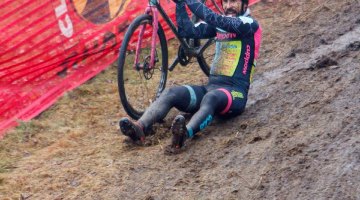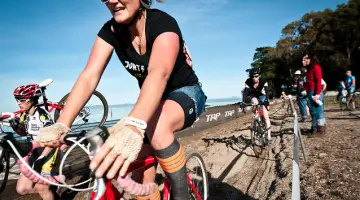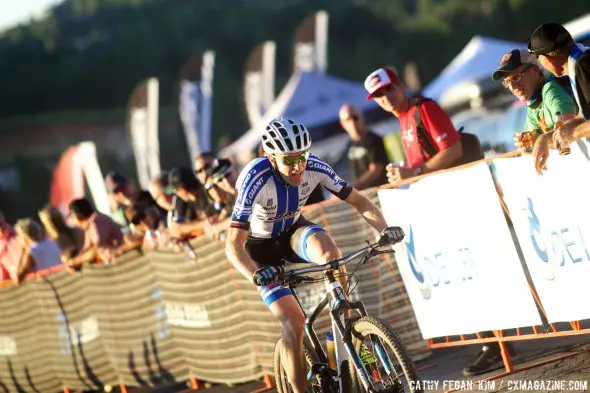
For a first ’cross race, don’t worry about having a cyclocross bike. Here, Carl Decker was more than happy with his bike choice, a MTB in an Elite race, and took the win. © Cathy Fegan-Kim
You’ve decided that you want to race ’cross, but there are still questions before the season starts. What kind of bike should you race? Should you run out and buy a new one right away? There are a few different options when it comes to bike selection.
Depending on what you currently own, be it a hybrid, touring, mountain, or road bike, you can probably cobble something together to test the race waters. You certainly aren’t forced to buy a ’cross-specific bike (although we could all use an excuse to snag an extra bike or two, right?). In fact, we suggest that you do at least try to race whatever bike you can to first try cyclocross: We’re sure you’ll love it, but once you experience it, your opinions on buying a bike, and how much you’ll want to spend, may change.
Mountain bikers interested in giving bunnyhopping the barriers a shot are free to race their fat knobby tires on a ’cross course, and if you look at the Raleigh Midsummer Night race, a mountain bike even won the Elite race (though wouldn’t have been legal for Nationals or any UCI event). Road bikes are a bit tougher, but still can give you a flavor for racing if you add on beefier road tires and avoid super muddy venues.
Courses are designed so that suspension isn’t necessary, but in bumpier areas, having it won’t hurt if you use a mountain bike. The main drawback is the added weight. Carrying a 30 pound full-suspension bike over barriers and pushing it up multiple run-ups can quickly wear a racer down.
In some cases, a modified road bike can be used. If the brakes, fork and rear stays allow for the tires to clear, you could mount fatter and more aggressive tires for the race. The biggest issues will be sloppy course conditions and braking. Standard road brakes offer minimal clearance, so you could find them getting clogged with mud when the rain starts to fall. The tight geometries of road bikes can also limit tire selections due to clearance ability.
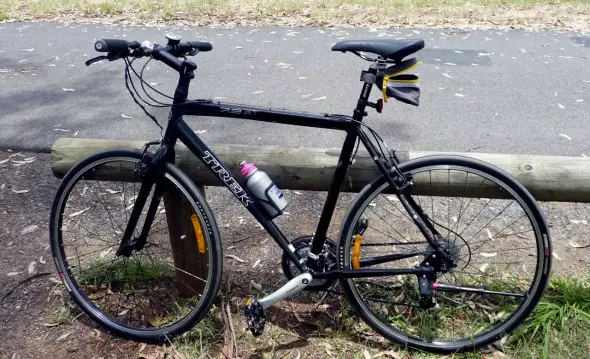
Hybrids, like this Trek 7.3 FX make great starter cyclocross bikes. Remove the kickstand, bottle cage and saddle bag and add some cx tires. © Sam Kingston on flickr
Hybrids and touring bikes make excellent first-time cyclocross bikes, because they typically have the right wheel size (700c), right brakes (cantilever or V-brakes), and have sufficient clearance for cyclocross width tires and room for some mud. Hybrids without suspension forks are best, as they will be lighter and more efficient on all but the bumpiest courses.
If you’re just starting out, the good news is that most races at the beginning of the season are dry enough that your brakes shouldn’t get mucked up with anything. Most importantly, don’t let yourself be pressured into spending money on a new bike for your first race.
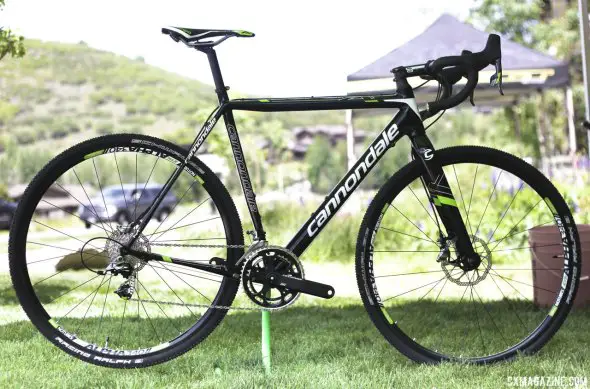
Here’s a “real” top-shelf cyclocross bike. Cannondale’s Super-X HiMod with Red 22 hydraulic disc brakes. © Cyclocross Magazine
With that in mind, there are a few rules. For any race, you need to have handlebar plugs in the ends of your handlebar. And if you’re starting off as a pro (good for you!) and popping into UCI races, you need a UCI-approved frame (look for the sticker), tires that are under 33mm wide.
There are usually local teams who can find a bike to lend you to test, or you may even have a friend with a pit bike who can give it up for a race or two so you can test the waters. Most cyclocross fanatics have multiple bikes, and are happy to lend them out if it means getting more people into the sport. Even asking around on our Cowbell Forums may net you a loaner bike, or find you a great deal on a used bike once you’re hooked.
Lastly, if you do want to look into buying a bike, check out our Bike Buyer Guide in Issue 21.
Get schooled in cyclocross with our Cyclocross Academy class list here, and make sure you’re subscribed to Cyclocross Magazine, your guide for getting into the sport, and upping your ’cross knowledge. Not subscribed yet? For the newbies, our Issue 21 has a great feature on buying your first cyclocross bike, and Issue 22 has a story on how to get into racing and what to expect at your first race.
Thanks to Mathew Shimoko for leading our FAQs effort.

























